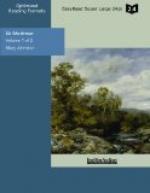“And the eagle followed the hawk,” muttered Arden. “Was there not one sparrow left alive, Robin?”
Robin mournfully shook his head. “The commoner sort went to the galleys; others were burned.... Is this city named Cartagena? Then ’twas in this city Captain Robert Baldry and Ralph Walter and more than they, dressed in sanbenitos, burning in the market-place.... We learned this at Margarita, so my master would go to Panama to wring the hawk’s neck.... But the Sea Wraith was heavy with gold and silver, and all the scoundrels upon her wished to turn homewards. But he bore them down, and there was a compact made and signed. For them all the treasure that we had gotten or should get, and for him their help to Panama that he might take his private vengeance.... And so we put on all sail and we coasted a many days, sometimes fighting and sometimes not, until we drew in towards the land and found a little harbor masked by an islet and near to a river. And a third of our men we left with the Sea Wraith. But Sir Mortimer Ferne and I—my name is Robin-a-dale—we took all the boats to go as far as we might by way of the river. And my master rowed strongly in the first boat, and I rowed strongly in the second, for we rowed for hate and love; but the other boats came on feebly, for they were rowed by ghosts—”
Arden moved beneath the emaciated form he held, and Powell uttered an ejaculation. But John Nevil used command.
“Back, sirrah! to the truth,” and the crowding fancies gave ground again.
“It was the Indians who shot at us poisoned arrows. They made ghosts of many rowers. Ha! in all my nineteen years I have not seen an uglier death! That was why we must leave the river, hiding the boats against the time that we returned that way ... returned that way.”
“You went on through the woods towards Panama. And then—” Nevil’s voice rose again.
“The wrath of God!” answered the boy, and turning within Arden’s clasp, began to babble of London streets and the Triple Tun. The claw-like hands had dragged themselves from Nevil’s hold, and the spirit could be no longer caught by the voice of authority, but wandered where it would.
The men about him waited long and vainly for some turn of the tide. It drew towards midnight, and Robin yet babbled of all things under the sun saving only of a man that had left England now three years agone. At last Nevil arose, spoke a few words to Arden, who nodded assent; then, with Powell, moved to the door.
“When will this friar return?” he asked, as they crossed the threshold.
“I do not know,” Powell answered. “With the dawn, perhaps. He will not be long gone.”
“Perhaps he will not come at all,” said the other. “You say that the boy is out of danger. Perhaps he hath returned to the Indians whom you say he teacheth.”
Powell shook his head. “Here are too many sick and dying,” he said, simply. “He will come back. I swear to you, Sir John Nevil, that in this pestilent camp between the city and the sea we do think of this man not as a Spaniard—if he be Spaniard—nor as monk—if he be monk! He hath power over this fever, and those whom he cannot cure yet cry out for him to help them die!”




